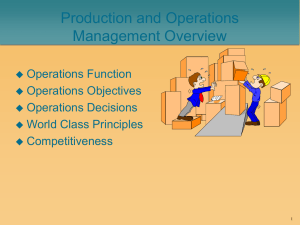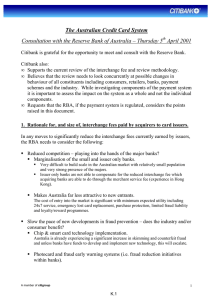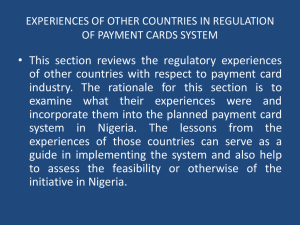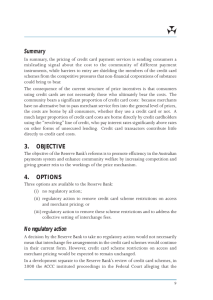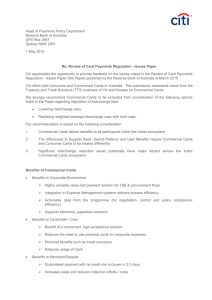25 January 2007 Dr John Veale Head of Payments Policy
advertisement
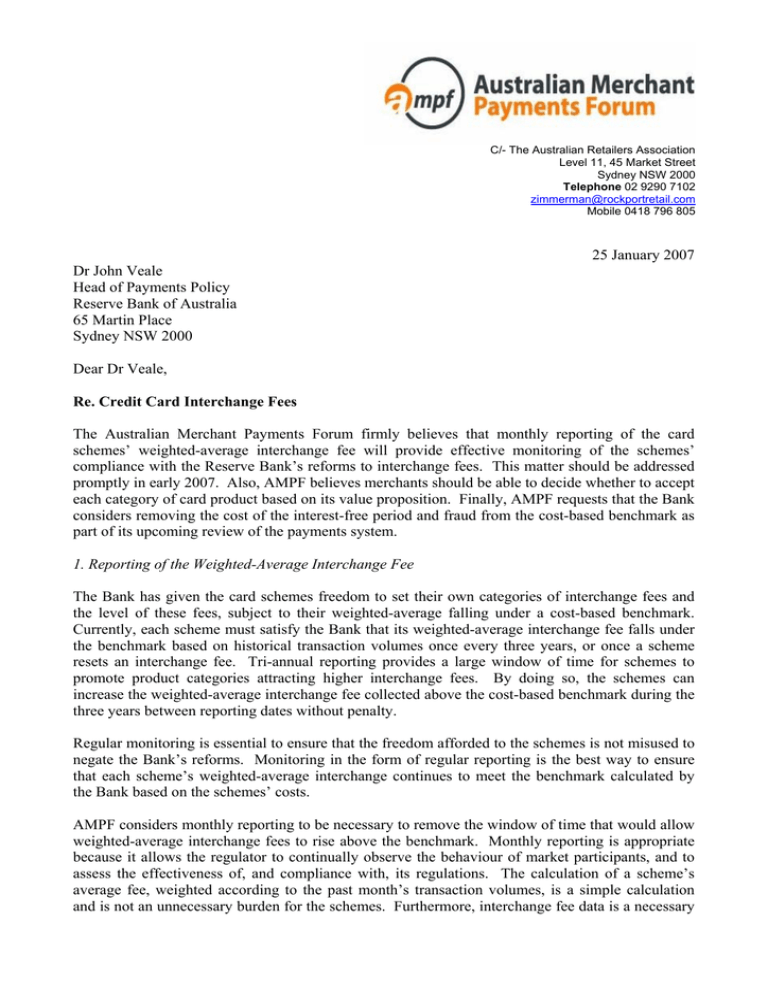
C/- The Australian Retailers Association Level 11, 45 Market Street Sydney NSW 2000 Telephone 02 9290 7102 zimmerman@rockportretail.com Mobile 0418 796 805 25 January 2007 Dr John Veale Head of Payments Policy Reserve Bank of Australia 65 Martin Place Sydney NSW 2000 Dear Dr Veale, Re. Credit Card Interchange Fees The Australian Merchant Payments Forum firmly believes that monthly reporting of the card schemes’ weighted-average interchange fee will provide effective monitoring of the schemes’ compliance with the Reserve Bank’s reforms to interchange fees. This matter should be addressed promptly in early 2007. Also, AMPF believes merchants should be able to decide whether to accept each category of card product based on its value proposition. Finally, AMPF requests that the Bank considers removing the cost of the interest-free period and fraud from the cost-based benchmark as part of its upcoming review of the payments system. 1. Reporting of the Weighted-Average Interchange Fee The Bank has given the card schemes freedom to set their own categories of interchange fees and the level of these fees, subject to their weighted-average falling under a cost-based benchmark. Currently, each scheme must satisfy the Bank that its weighted-average interchange fee falls under the benchmark based on historical transaction volumes once every three years, or once a scheme resets an interchange fee. Tri-annual reporting provides a large window of time for schemes to promote product categories attracting higher interchange fees. By doing so, the schemes can increase the weighted-average interchange fee collected above the cost-based benchmark during the three years between reporting dates without penalty. Regular monitoring is essential to ensure that the freedom afforded to the schemes is not misused to negate the Bank’s reforms. Monitoring in the form of regular reporting is the best way to ensure that each scheme’s weighted-average interchange continues to meet the benchmark calculated by the Bank based on the schemes’ costs. AMPF considers monthly reporting to be necessary to remove the window of time that would allow weighted-average interchange fees to rise above the benchmark. Monthly reporting is appropriate because it allows the regulator to continually observe the behaviour of market participants, and to assess the effectiveness of, and compliance with, its regulations. The calculation of a scheme’s average fee, weighted according to the past month’s transaction volumes, is a simple calculation and is not an unnecessary burden for the schemes. Furthermore, interchange fee data is a necessary -2- part of the information needed by the Bank to fulfil its role as overseer and regulator of the payments industry. AMPF considers it necessary for the Bank to establish penalties for breaches of the cost-based benchmark by the schemes, and to detail the circumstances under which these penalties will be applied. This should take place at the same time as any changes are made to the frequency at which the schemes are required to report their weighted-average interchange fee. In addition, the weighted-average interchange fees reported by the schemes should be published by the Bank. Without transparency and penalties for non-compliance, the effectiveness of the Bank’s credit card reforms will be diluted. AMPF believes that the Bank should address this matter in early 2007, prior to the review of its payment system reforms. A prompt assessment of this issue will eliminate any potential for negation of the Bank’s interchange reforms in the meantime. Furthermore, this is a stand-alone issue which can be addressed rapidly, and any change in reporting frequency should be accommodated without the need for a substantial lead time. Related to the issue of weighted-average interchange reporting is the schemes’ setting of interchange categories, and the components of the cost-based benchmark. These issues also deserve the Bank’s consideration. 2. Merchant Acceptance of Card Product Categories The freedom afforded to card schemes to set their own interchange categories and rates should be parallelled by allowing merchants to choose which card products they accept. This means allowing merchants to decide whether they will accept each range of products with its own interchange rate, or whether to only accept particular products from within these product ranges. This freedom will prevent card schemes from forcing merchants to accept high interchange products, just as merchants can decide separately whether to accept scheme credit and scheme debit cards. Without this discretion, retailers will be forced to accept high cost card products and pass these costs through to all consumers through higher prices. This arrangement will also prevent card schemes from requiring merchants to accept substantially different products with the same interchange rate. For instance, both Visa and MasterCard have been given the freedom to set a separate interchange rate for premium cards. It is appropriate that merchants be given the right to choose whether to accept this category of cards. Implementation of this recommendation would require schemes and acquirers to enhance arrangements in place for the visual and electronic identification of particular card products. 3. Cost of Funding the Interest-Free Period The inclusion of the cost of funding the interest-free period in the cost-based benchmark allows for scheme participants to reduce the number of interest-free days offered on their cards after the benchmark has been set. At present, this strategy would provide scheme participants with three years to take advantage of the overstated cost-based benchmark. AMPF views the inclusion of the cost of funding the interest-free period in the cost-based benchmark as inconsistent with the spirit of the Bank’s reforms. The user-pay philosophy underlying these reforms requires that consumers choose their payment instrument based on the effective price of each instrument. By including the cost of the interest-free period in interchange fees, this cost is not reflected in the price signals facing consumers. This distorts the decision -3- making process of consumers. Consequently, consumers paying with instruments other than credit cards continue to subsidise the costs of credit card users. AMPF requests that the inclusion of the cost of funding the interest-free period in the cost-based benchmark be addressed as part of the impending review of payment system reforms. 4. Cost of Fraud and Fraud Prevention AMPF is reasserting its stance that the cost of fraud and fraud prevention should be excluded from the cost-based benchmark. Currently, Australian merchants bear the cost of chargeback transactions, for which the merchant’s processes are found to be at fault. Merchants also bear the cost of other fraudulent credit card transactions incurred by issuers, where the merchant has fulfilled all its responsibilities. This cost is passed on to merchants via the interchange fee. It is inappropriate that merchants reimburse issuers for this cost when the merchant is not at fault, and the responsibility for preventing this fraud rests with issuers. Including fraud costs in credit card interchange fees removes the financial incentive for card schemes and their issuers to reduce levels of fraud. As a consequence, Australian credit cards still have signature authorisation, which is more susceptible to fraud than other methods of authorisation. Thank you for the opportunity to express our views. AMPF welcomes the opportunity to discuss its submission with the Bank as part of its consultation process. Yours sincerely, Russell Zimmerman AMPF Chair Cc Michele Bullock – Chief Manager, Payments Policy, Reserve Bank of Australia AMPF members include: Australia Post Australian Retailers Association (representing some 12,000 retailers Australia wide) BP Bunnings Caltex Coles Group Mitre 10 Spark’s Shoes Pty Ltd Woolworths Limited
